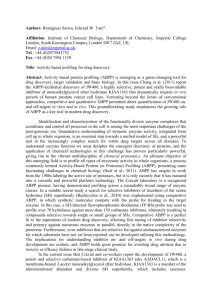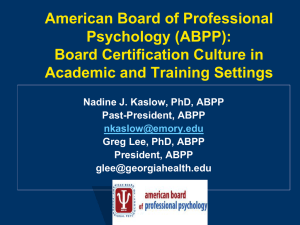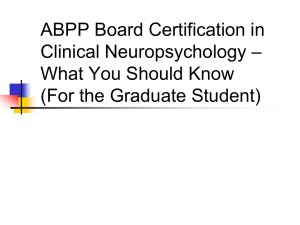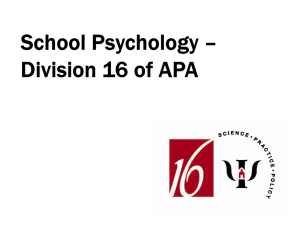Strategic Planning - American Board of Professional Psychology
advertisement
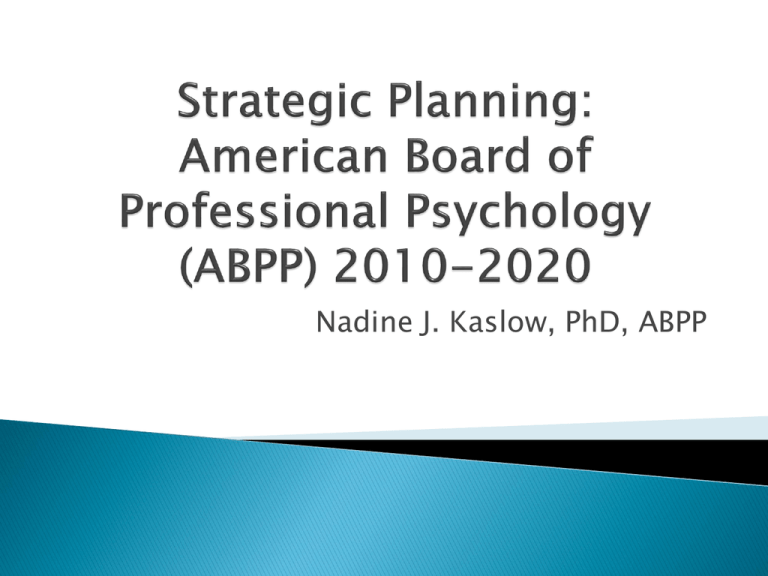
Nadine J. Kaslow, PhD, ABPP There is a culture shift such that board certification in psychology has the same status and level of expectation as board certification in medicine Board Certification by ABPP is the expected standard for specialty practice in professional psychology at the entry level The public recognizes ABPP as the premiere body for specialty board certification and evaluation of the maintenance of competence Board certification by ABPP is expected by all organizations that hire and employ psychologists and by all groups that credential psychologists There is differential pay and reimbursement for ABPP board certified psychologists Students learn the value from their educators and trainers that board certification is the endpoint and view board certification as accessible ABPP has strong senior partnerships with all relevant professional organizations, including education, training, credentialing, employment, and psychology groups The ABPP Central Office has the human, financial, technological and communication resources needed to provide comprehensive service and to support to all relevant constituencies At least ◦ 40-50% of (eligible) psychologists are board certified by ABPP ◦ 50% of employers and credentialing bodies require ABPP board certification ◦ 40% of the faculty in training programs are board certified ◦ 80% of all training directors are board certified ◦ 50% of accreditation site visitors are board certified The diversity in board certified psychologists matches that of licensed professionals The American Psychological Association (APA) has the data regarding board certification in their data base Consumers ask if their psychologist is board certified and referrals from others are based on ABPP status Student groups, such as the Association of Psychology Graduate Students, recognize the value of the credential and demand attention to preparation for board certification as an endpoint for training programs APA, Association of State and Provincial Psychology Boards (ASPPB), the Council of Chairs of Training Councils (CCTC), and others request active ABPP participation – ABPP is expected to be there in a leadership role ABPP is a convener of major conferences ABPP is a recognized point of contact for the public and media The boards and academies are under one clear governance ABPP has a state-of-the-art website ABPP has one full year operating expenses in reserves ABPP has multiple funding streams to support its activities The ABPP Foundation has 100K ABPP Central Office staff size is commensurate with the demand of load Culture change in psychology Higher standard of practice and a stronger psychology profession Greater recognition by payors/employers, with enhanced negotiating position for psychologists More educational efforts for psychologists More diversity among board certified psychologists Students are the driving force for specialty board certification Better service to the public and greater ease of identification by the public of quality providers/services Disappearance of vanity boards Better able to invoke change in policy and in the profession We finally reach “tip”, when more licensed psychologists are board certified than not – this will afford us the momentum needed to assure long-term success ABPP is more rigid, stagnant, bureaucratic Increased internal politics and factions Greater likelihood of litigation, as what is now the essential credential is withheld/revoked Greater scrutiny by government, especially restraint of trade, need for regulation Huge workload of exam demand and infrastructure Some “ABPP elitists” will be upset Disenfranchise some experienced psychologists who believe their competence is being questioned Resistance and push back from more and more powerful enemies Other board certifying organizations hate us Some boards/academies upset Too much workload for Central Office and don’t expand it as needed Psychologists Have more clarity regarding expectations Are more confident and more secure regarding their livelihood Have a higher standard of living Have more respect by the community and other professions Complete license/credentialing portability across jurisdictions We are busy, but adequately staffed We have multiple subcommittees that are very productive in a quasi-independent fashion Subspecialties have evolved and perhaps some have become specialties We actively lobby and are actively lobbied We set a pace for policy We are quoted in the media We are a leader in new initiatives We can focus our energy on new projects, initiatives, etc. We have a large headquarters and our own building We are not struggling with our sister organizations, but we are welcomed by them We have a sense of excitement and enthusiasm about ABPP Ensure that ABPP is the only specialty board credentialing body in professional psychology Have vibrant, active, and sizeable specialties Add new boards as new specialties emerge and there are enough people in the specialty Gain full endorsement of board certification as an endpoint of education by APA Have ABPP Continuing Education Workshops as the predominant continuing education vehicle for professional psychology Ensure that each specialty board has ◦ An official journal, with associated on-line continuing education credits that includes consensus statements and position papers ◦ On-line based continuing education book series written by key ABPP experts (workshop books, traditional books) ◦ A close affiliation with an APA division or some other focused professional society ◦ A role in the creation of specialty specific residency training programs Have each specialty board publish consensus statements and related position papers Ensure that each specialty board hosts an annual meeting (specialty board meeting, examinations, continuing education workshops) Encourage each specialty board to hold a training model conference that creates a blueprint document for the specialty Create large testing centers in geographical areas Have some specialty boards test simultaneously so that greater numbers of exams are given at one time on a national basis Take the lead in major conference initiatives that shift the landscape in psychology, possibly related to assessment and maintenance of competency Assist in the changing of training models to ensure ABPP eligibility of all students completing training Work with the Commission on Accreditation and the APA Education Directorate to require ABPP of training directors Have widespread buy-in of the early entry program Ensure that application upon completion of residency programs is expected/required Infuse diversity and inclusiveness in all aspects of ABPP and board certification Ensure that all jurisdictions recognize ABPP as a specialty credential and for mobility Expand the Central Office Partner with quality improvement organizations Influence employers and payers to recognize the credential as essential to employment and credentialing Work to ensure that payers and employers provide bonuses to those holding the credential Prioritize individual and cultural diversity in our membership and examination process Partner with American Hospital Association and others to get hospital requirements for ABPP on staff Identify one or more granting organizations to support ABPP Initiate public relations effort, including media attention and contact with the government, and make statements of public interest Undertake public education campaign Support an active mentoring system for each specialty board that includes ◦ ◦ ◦ ◦ ◦ Workshops at meetings Web-based materials Workshop-related small books List of local mentors List of support/study groups Conduct an outcome study of board certified psychologists and of the boards Develop and institute a recertification plan Ensure that ABPP has a constantly changing website that meets the needs of the public Support the low performing boards Board certification is dominant within psychology There is a national culture shift ABPP represents the most viable means of demonstrating advanced competence in professional psychology ABPP demonstrates the same level of importance in psychology as board certification has in medicine ABPP has a strong connection with educational programs/community and students see certification as an endpoint Agencies and hiring authorities, across settings, see ABPP as key to employment ABPP is a leader on the national scene There is strong student drive demand for attention to board certification There is strong central office and infrastructure There are different expected numbers of ABPPs in 2020 Training directors involved versus not a road that will be productive Level of integration of boards and academies Level of inclusiveness Level of exclusiveness Only product that assesses hands-on competency – more fidelity in our assessments History of developing these credentialing methods Longevity of the organization Dedicated, hardworking, and imaginative Board of Trustees Well respected Executive Director Strong Central Office Staff Diversity in many different factors Diversity committee is a standing committee of the organization Umbrella organization that has multiple specialties being board certified Founded on psychology and have a scientific knowledge base Increasingly at the education, training, and credentialing tables No other peer organizations Absence of a public recognition for both board certification and ABPP Voluntary leadership has many competing professional demands Lack of peer pressure and expectation Confusion to the public Not masters of our own fate Well kept secret in our own profession Too modest Within psychology, seen as exclusive, elitist, and irrelevant We have missed opportunities Lack a sufficiently diverse array of communication medium that will appeal to all generations Lack sufficient financial resources No or very little empirical evidence that board certified psychologists are high quality Impressive board High quality board certified psychologists Cadre of ABPP ambassadors American Psychological Association Graduate Student (APAGS) article Liaison relationships with many key organizations ABPP book Executive Director and Central Office staff Upcoming Continuing Education conference APA events Meet and greet for Directors of Clinical Training Some specialties have conferences Liaison relationships with key publishers and editors Agree upon a soft target for number of new board certified psychologists and work toward that goal Partner with the most likely education, credentialing, and student groups to increase number of board certified psychologists and the value of board certification (e.g., APA Education Directorate, CCTC, ASPPB, APAGS) Communicate the ABPP message through multiple venues, including success stories Craft an internal document and blueprint to help specialty boards be more successful and to communicate most effectively with the public Develop a cadre of ambassadors engaged in moving forward the ABPP agenda (academies, board certified psychologists in leading positions) and ensuring ABPP is more inclusive and diverse and create talking points for them Devise strategies to help ABPP gain greater public recognition and improve its public relations Education and credentialing community plan – Kendall*, Hibbard, N. Kaslow, Otto, Cox Communication plan – Thomas*, Goldberg, Barlow, Lee Specialty board plan – Sweet*, Eichel*, Ronan, Tansy Ambassador plan – F. Kaslow*, Besyner, Davidson, Morris, Goldstein Public recognition and relations plan – Linton*, Nezu, Douglas, Pollard Checklist for specialty board Connect with education community Connection with ASPPB Cadre of ambassadors – engaging them, 1 page of talking points Communication plan Pick group to partner with and develop active partnership Set target number and plan to move toward it
